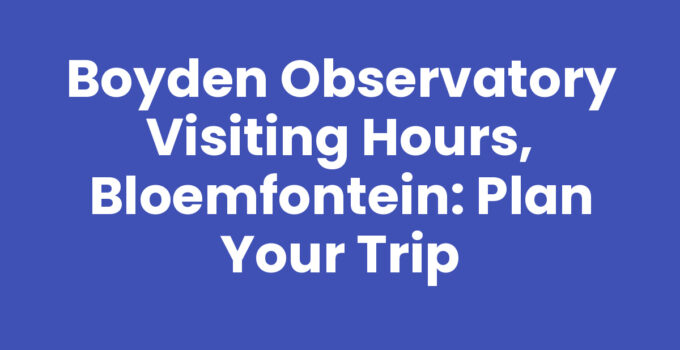The Boyden Observatory, a gem nestled in Bloemfontein, is a haven for astronomy enthusiasts and curious minds alike. Known for its stellar features, rich history, and breathtaking views of the night sky, the observatory offers a unique experience for visitors. Whether you’re planning a family outing, a romantic evening, or simply want to witness the wonders of the cosmos, understanding the visiting hours and best practices will enhance your adventure.
Boyden Observatory Visiting Hours, Bloemfontein
When planning a trip to the Boyden Observatory, the first question on most visitors’ minds is: what are the visiting hours? The observatory has specific hours where it opens its doors to the public, allowing for extraordinary stargazing and educational experiences.
The typical visiting hours at the Boyden Observatory are:
- Wednesday to Friday: 7:00 PM – 10:00 PM
- Saturday: 4:00 PM – 10:00 PM
- Sunday: 4:00 PM – 7:00 PM
Note: It’s advisable to check the official website or contact the observatory directly for any changes to hours, especially around holidays or special events.
Visiting during these hours grants you access to a range of activities:
- Guided tours of the facility
- Hands-on exhibits related to astronomy and space science
- Live observatory sessions with astronomers
To maximize your experience, arriving early is recommended. This allows time for parking, ticket purchase, and browsing any on-site exhibits before the evening’s main events. Remember to dress appropriately for the weather and bring a telescope or binoculars if you have them, although the observatory provides access to high-quality telescopes.
Related Guide: Reliable Pet Transport Services by Road, Bloemfontein
Exploring the Wonders of Astronomy at Boyden Observatory
The Boyden Observatory is not just about the visiting hours; it’s also a place enriched with knowledge and experiential learning. On any given night, weather permitting, visitors can expect:
- Stargazing Events: Through powerful telescopes, you can gaze at celestial bodies, including planets and star clusters.
- Astronomy Talks: Educational sessions presented by experienced astronomers who share their insights about the universe, upcoming astronomical events, and recent discoveries in the field.
- Interactive Exhibits: Engage with various displays that explain astronomical concepts using visual aids and models.
These activities are incredibly enriching for students, families, and anyone interested in the sciences. Take this chance to ask questions and gain deeper insights from knowledgeable staff members.
Related Guide: Finding an Educational Psychologist in Bloemfontein: Your Guide
Planning Your Visit to Boyden Observatory
To ensure a seamless visit to Boyden Observatory, consider these essential tips:
- Make a Reservation: While the observatory welcomes walk-ins, it’s wise to book in advance, especially on weekends or during special events.
- Check the Weather: Cloudy nights will obscure your view. Keep an eye on weather forecasts leading up to your visit.
- Bring Essentials: Pack a light jacket, comfortable shoes, and refreshments. Depending on your visit, you might want to carry a notebook for taking notes during talks.
- Follow COVID-19 Guidelines: Always stay updated on health protocols to ensure a safe visit.
In conclusion, a visit to the Boyden Observatory can be a memorable and educational experience. Understanding the visiting hours and planning accordingly makes it easy to enjoy what this remarkable place has to offer. Get ready to embark on a cosmic journey and discover the universe from a vantage point unlike any other!
Further Reading: Intercape Sleeper Class Reviews: Comfort on Your Bloemfontein Journey
Frequently Asked Questions
What are the best times to visit Boyden Observatory?
The best times to visit are Wednesday to Friday from 7 PM to 10 PM and Saturday from 4 PM to 10 PM for stargazing activities.
Is there an admission fee for Boyden Observatory?
Yes, there is an admission fee, but it varies by age and specific events. Check the official website for current rates.
Can I bring my own telescope?
Yes, you can bring your own telescope or binoculars. However, the observatory also provides access to high-quality telescopes.



